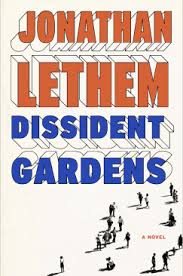Dissident Gardens
By Jonathan Lethem
Doubleday, 384 pp.
Jonathan Lethem’s latest novel, Dissident Gardens, weaves together Communism, socialism, hippieism and even the Occupy movement — the threads of dissent in American culture — only to have them unravel. His characters seem unconcerned with maintaining their objective ideological identities if they appear to be at odds with their personal aspirations.
Lethem began his career hoping to become a writer of cheap sci-fi paperbacks, but the ghosts he exposes no longer take the shape of anthropomorphic kangaroos or baby faces (Gun, with Occasional Music). Instead, the MacArthur Fellow describes a multigenerational family drama of radicals and Communists, something that would struggle to grace the pages of the War Free edition of the New York Times (Chronic City), regardless of the protagonists’ predilections for pacifism. Their world is a working-class slog, which is the only way they’d have it (they’d let you know), buried in the socialist enclave of Sunnyside Gardens.
The story opens with Rose Zimmer, “pure pugilistic screw-you Noo Yawk,” being put on trial by her small cell of the Communist Party. Wishing not to incite too much backlash from the fiery Rose, “their incessant, mealy-mouthed usage, droning again and again from the fog of their talk was ‘associations.’… They meant, of course, the association of her rapidly aging Jew Communist vagina with the black lieutenant’s sturdy and affectionate penis.”
Lethem is a master of preordained regret, idealists’ minds chagrined by the conditions of the world their bodies have been forced to inhabit. He has always enjoyed creating claustrophobic social spaces for his characters, forcing them to acknowledge the shortcomings of their own eccentric and brazenly ideological approaches to dealing with what they see to be societal flaws. He succeeds in Dissident Gardens when the characters set their own snares. Rose Zimmer was born Jewish in 1920s New York, but found herself compelled to take on her own brand of virulent Communism, marry a German immigrant, and have an affair with a black cop.
With her lover’s son, Cicero, an overweight homosexual black man described with Lethem’s sullen facetiousness as a “career magical Negro,” Rose sees her opportunity to properly honor the memory of Lincoln contained in Carl Sandburg’s six volume biography:
His scholastic excellence was an offering to gratify Rose: She’d produced a marvel! A black brain!…One of his minor revenges: Rose’s Marxism quit at Marx. When Cicero’d one time popped a little Deleuze and Guattari on her ass, she’d balked.
Young Cicero shows signs of becoming a chess prodigy, but after being thoroughly beaten in a chess match by his cousin Lenny, Rose’s daughter Miriam, takes him to an astrologer to learn his fate. Astrological inquiry, which subtly weaves its way through the novel, is what Lethem characterizes as a “fake lie”:
Cicero’s capacities were reserved for the lies that mattered. Ideology, although that word was as yet unknown to him: the veil of sustaining fiction that drove the world, what people needed to believe. This, Cicero wished to unmask and unmake, to decry and destroy.
The central figures of the novel; Rose, Miriam, and Cicero, have this in common. They cling to their ideas and deny the locality of human suffering; if you don’t think there’s a problem right underneath your nose they’ll find a way to situate one there.
While the three of them bear the brunt of each others’ criticism, others also get caught in the crossfire. Miriam’s husband, Tommy Gogan, is a struggling folk musician in the 1960s who learns that being known as a Dylan can be just as constraining as being a Commie. (His name, to me, is a play on Gauguin, as he attempts to find a place for his post-impressionistic art within the expressionistic currents of the age.)There’s also Lenny (Lenin), who attempts to have “The Sunnyside Proletariats” become the the new ball club in Queens, instead of the Mets.
That the plot is minimal shouldn’t come as a surprise, given the political nature of the characters. The “real lies,” or ideologies, are intentionally disparate, and Lethem’s failure to tie them together is nothing but a parallel to the individualized nature of Leftist thought. Although, it can also be said that Lethem gets lost in his own ideology, and his conclusions lose some of the emotional strength they’re seeking as a result.
Rose, realizing that her once ardent Communist sympathies are dissipating later in life, finds that she’s maintained her pseudo-ideals, which really “existed in the space between one person and another, secret sympathies of the body.” Lethem’s fictionalized Archie Bunker gives this the name of “Comraderism.” She had once found it in rallies and protests, where people got together to wage their own wars, but later in life finds that it’s just as available at the funerals of Jews she’s never known or with an old bigot at the bar. Her epiphany, however, seems like just another idealistic rationalization, as if she, like Lethem, is in love with the idea of camaraderie as the grand answer, but fails to make her actions anything but placeholders for her thoughts. The realizations seem hollow, without body; but maybe it was all a fake lie.

